The EPSRC-funded CirculaR economy of small Medical devices (ReMed) project – led by the Centre for Sustainable Manufacturing and Recycling Technologies (SMART) – brings together experts from Loughborough’s Business School, School of Design and Creative Arts and Wolfson School of Mechanical, Electrical and Manufacturing Engineering alongside colleagues from Leeds.
Together, they are identifying the challenges and barriers to the circular use of medical devices and developing potential sustainable solutions.
Waste generated by the widespread use of SMD has escalated in recent years as the monitoring and treatment of a range of conditions become increasingly dependent on them.
Predominantly hand-held or portable, SMD include equipment that monitors patient blood pressure, glucose, gluten, sleep and pulse rates as well as inhalers, defibrillators, oxygen machines, smart thermometers, infusion pumps, intraoral cameras, electrical thermal pads and other pain relief devices, small surgical tools, insulin pens, catheters and custom packs.
Designed or designated for single use, the current recovery, reuse and recycling of SMD is limited – and for a number of reasons.
Crucially, there are fears of cross contamination and infection. In addition, product design information that would facilitate reprocessing is not available and there are few, if any, recycling collection structures in place. Moreover, most powered SMD are classed as electrical and electronic equipment (EEE), adding to existing e-waste (WEEE) challenges.
However, reprocessing SMD could deliver potential savings of around 50%, significantly reducing NHS costs.
ReMed is, therefore, exploring several avenues to drive the move to the circular use of resources and materials including novel design and material specifications as well as safe and sustainable reprocessing technologies.
An important element of the project’s work is industry engagement to ensure feasibility and acceptance.
On 22 June, ReMed invites designers, engineers, practitioners and industrialists from across the medical supply and recovery chains as well as representatives from NHS Trusts and other healthcare organisations to attend an interactive workshop to help shape the future of resource efficiency and waste minimisation within the healthcare sector.
Shahin Rahimifard, Professor of Sustainable Engineering and ReMed Lead, says of the event: “To safeguard limited resources and reduce environmental impacts, it is imperative that we address this pressing challenge. We look forward to welcoming a range of stakeholders to the workshop and are confident that together we will establish a raft of safe and sustainable innovations and technologies.”
Dr Antuela Tako, ReMed Co-Investigator, adds: “We are excited to work with industrial stakeholders on this project, supporting the NHS to reduce its carbon footprint and achieve its Net Zero Strategy.”
The FREE workshop will take place on Thursday 22 June at the West Park Teaching Hub on the Loughborough University campus.
To find out more and register for the event, please complete the online registration form.
